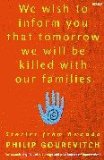Summary | Excerpt | Reviews | Readalikes | Genres & Themes | Author Bio
Stories From Rwanda

Critics' Opinion:
Readers' Opinion:
First Published:
Sep 1998, 356 pages
Paperback:
Mar 2000, 368 pages
Excerpt
We Wish To Inform You That Tomorrow We Will Be Killed With Our Families
IN THE PROVINCE of Kibungo, in eastern Rwanda, in the swamp- and pastureland near the Tanzanian border, there's a rocky hill called Nyarubuye with a church where many Tutsis were slaughtered in mid-April of 1994. A year after the killing I went to Nyurabuye with two Canadian military officers. We flew in a United Nations helicopter, traveling low over the hills in the morning mists, with the banana trees like green starbursts dense over the slopes. The uncut grass blew back as we dropped into the center of the parish schoolyard. A lone solider materialized with his Kalashnikov, and shook our hands with stiff, shy formality. The Canadians presented the paperwork for our visit, and I stepped up into the open doorway of a classroom.
At least fifty mostly decomposed cadavers covered the floor, wadded in clothing, their belongings strewn about and smashed. Macheted skulls had rolled here and there.
The dead looked like pictures of the dead. They did not smell. They did not buzz with flies. They had been killed thirteen months earlier, and they hadn't been moved. Skin stuck here and there over the bones, many of which lay scattered away from the bodies, dismembered by the killers, or by scavengers--birds, clogs, bugs. The more complete figures looked a lot like people, which they were once. A woman in a cloth wrap printed with flowers lay near the door. Her fleshless hip bones were high and her legs slightly spread, and a child's skeleton extended between them. Her torso was hollowed out. Her ribs and spinal column poked through the rotting cloth. Her head was tipped back and her mouth was open: a strange image--half agony, half repose.
I had never been among the dead before. What to do? Look? Yes. I wanted to see them, I suppose; I had come to see them--the dead had been left unburied at Nyarubuye for memorial purposes--and there they were, so intimately exposed. I didn't need to see them. I already knew, and believed, what had happened in Rwanda. Yet looking at the buildings and the bodies, and hearing the silence of the place, with the grand Italianate basilica standing there deserted, and beds of exquisite, decadent, death-fertilized flowers blooming over the corpses, it was still strangely unimaginable. I mean one still had to imagine it.
Those dead Rwandans will be with me forever, I expect. That was why I had felt compelled to come to Nyarubuye: to be stuck with them--not with their experience, but with the experience of looking at them. They had been killed there, and they were dead there. What else could you really see at first? The Bible bloated with rain lying on top of one corpse or, littered about, the little woven wreaths of thatch which Rwandan women wear as crowns to balance the enormous loads they carry on their heads, and the water gourds, and the Converse tennis sneaker stuck somehow in a pelvis.
The soldier with the Kalashnikov--Sergeant Francis of the Rwandese Patriotic Army, a Tutsi whose parents had fled to Uganda with him when he was a boy, after similar but less extensive massacres in the early 1960s, and who had fought his way home in 1994 and found it like this--said that the dead in this room were mostly women who had been raped before being murdered. Sergeant Francis had high, rolling girlish hips, and he walked and stood with his butt stuck out behind him, an oddly purposeful posture, tipped forward, driven. He was, at once, candid and briskly official. His English had the punctilious clip of military drill, and after he told me what I was looking at I looked instead at my feet. The rusty head of a hatchet lay beside them in the dirt.
A few weeks earlier, in Bukavu, Zaire, in the giant market of a refugee camp that was home to many Rwandan Hutu militiamen, I had watched a man butchering a cow with a machete. He was quite expert at his work, taking big precise strokes that made a sharp hacking noise. The rallying cry to the killers during the genocide was "Do your work!" And I saw that it was work, this butchery; hard work. It took many hacks--two, three, four, five hard hacks--to chop through the cow's leg. How many hacks to dismember a person?
(c) 1998 Philip Gourevitch All rights reserved.





The Flower Sisters
by Michelle Collins Anderson
From the new Fannie Flagg of the Ozarks, a richly-woven story of family, forgiveness, and reinvention.

The House on Biscayne Bay
by Chanel Cleeton
As death stalks a gothic mansion in Miami, the lives of two women intertwine as the past and present collide.

The Funeral Cryer by Wenyan Lu
Debut novelist Wenyan Lu brings us this witty yet profound story about one woman's midlife reawakening in contemporary rural China.
Your guide toexceptional books
BookBrowse seeks out and recommends the best in contemporary fiction and nonfiction—books that not only engage and entertain but also deepen our understanding of ourselves and the world around us.